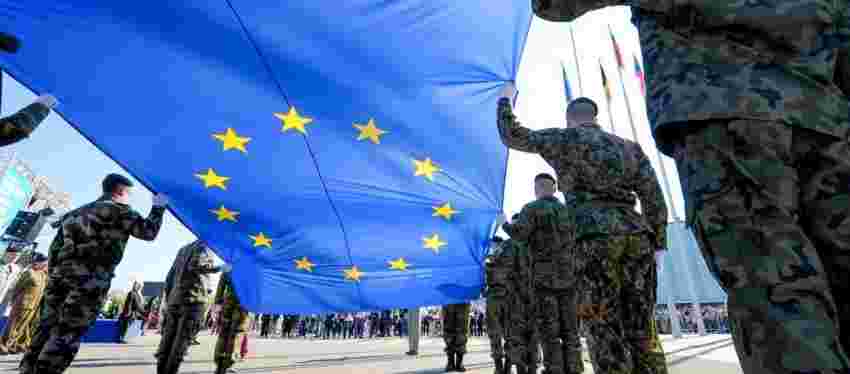
Since the treaty of Nice in 2001, the European Union created the European Politcy of Common Security (known as the EPCS), led by the high representative of external policies, previously Ravier Solana. But we can’t properly speak
about an European army, and what is displayed is more an orientation strategy, like the Strategy of Security in 2003 that identifies the threats and the objectives the Union has to reach in a defense field.
The main question is so why a common European army didn’t emerge, while the security is nowadays a burning subject on an international scale? We particularly think about the struggles against Daesh and the tensions in Ukraine that both concern the European territory.
This question is raising three principles challenges:
- First, the NATO is mostly inactive, like a dead institution that doesn’t really protect anything anymore. So when we speak about external operations nowadays, we mainly refer to intergovernmental actions by France and the United Kingdom for instance. There is no real solidarity on the military plan between all the European countries, and if one of them is in need, it’ll probably fight alone.
- Another important fact: with the Brexit, the EU lost one of its most powerful army, and lost a great part of its fleet and aviation. Many European countries are very weak and can’t defend themselves alone, so there is a great need to reinforce our army.
- Finally, a major difficulty is that defense depends of national sovereignty. It’s a precious nationalist electoral argument, and the governments want to keep it under their control. It might massively slow the negotiations and unanimity.
On this dialogue between sovereignty and integration, Nico Greonendijk published an article in 2019[1] where it shows that EU is developing flexibility mechanisms and tries to put a differential integration in place. It’s basically the principle of variable geometry: the officials study the monopole that represents the defense for each country on a national level and then adapt their devices to each country. The main goal is to generate a sort of feeling of belonging to a common culture, a community. This adaptable governance may also facilitate the debates and permits to reach an agreement easier.
The common army is also a financial solution for national governments. For Jean Dominic Giuliani[2], the security subject spills over the simply defense national experts and is more concentrated in the hands of high officials from the finance services. For these officials, it’s a rational calculation because the States can’t afford anymore the cost of an army that doesn’t fight, but remains efficient in the same time. Indeed, like an
intercommunal police does on a local scale, the sharing of military costs allows a greater common army, and lowers the cost to maintain an army on a national level. Every one is a winner in this game: the little countries get access to a efficient army, and the great countries pays less for their own security.
Moreover, a common army allows the European integration of the soldiers. Christophe Pajou shows[3] that in his work where he led an analysis of the reception of this integration on the German, French and British soldiers: it’s a bottom up study without denying the importance of the European elite who contributed to create and establish the strategies. By fighting together and sharing the same practices, soldiers develops some sense of belonging to same entity, a sort of supranational entity with superior and nobler objectives than they have on local field. Despite the different national visions of the job, the relation with the authorities and all the national culture pack they may mobilize, the integration is so powerful that it can create such feeling of belonging to the same superior group.
What is important to understand here is that an army is a great indicator of a forming state. Creating a nation must including the formation of a common army to embody the fact we belong to a community. The power of the European integration in the military field is very instructive. It could probably be the strongest way to wake a European among citizen. Let’s add that an army is a deep representation in population’s mind. People can easily identify themselves to these heroes and feel comfortable with the idea of being protected. The European army can be a way to reinforce the presence of EU on the field, where its absence is largely criticized.
As the president of France Emmanuel Macron says, it’s probably the time to create a huge entity as the European army. It will strengthen the legitimacy of EU as a great international and regional power and can spark a great sense of integration through the population and the military elites. Let’s recall that it’s also a demand of these elites to create this type of entity.
[1] Flexibility and differenciated Integration in European Defense Policy, Nico Greonendijk (2019)
[2] L’Europe et la défense, ne nous trompons pas de combat, Jean Dominic Giuliani (2007)
[3] L’Europe de la défense et la transformation des identités militaires : quelle intégration ?, Christophe Pajou (2003)














